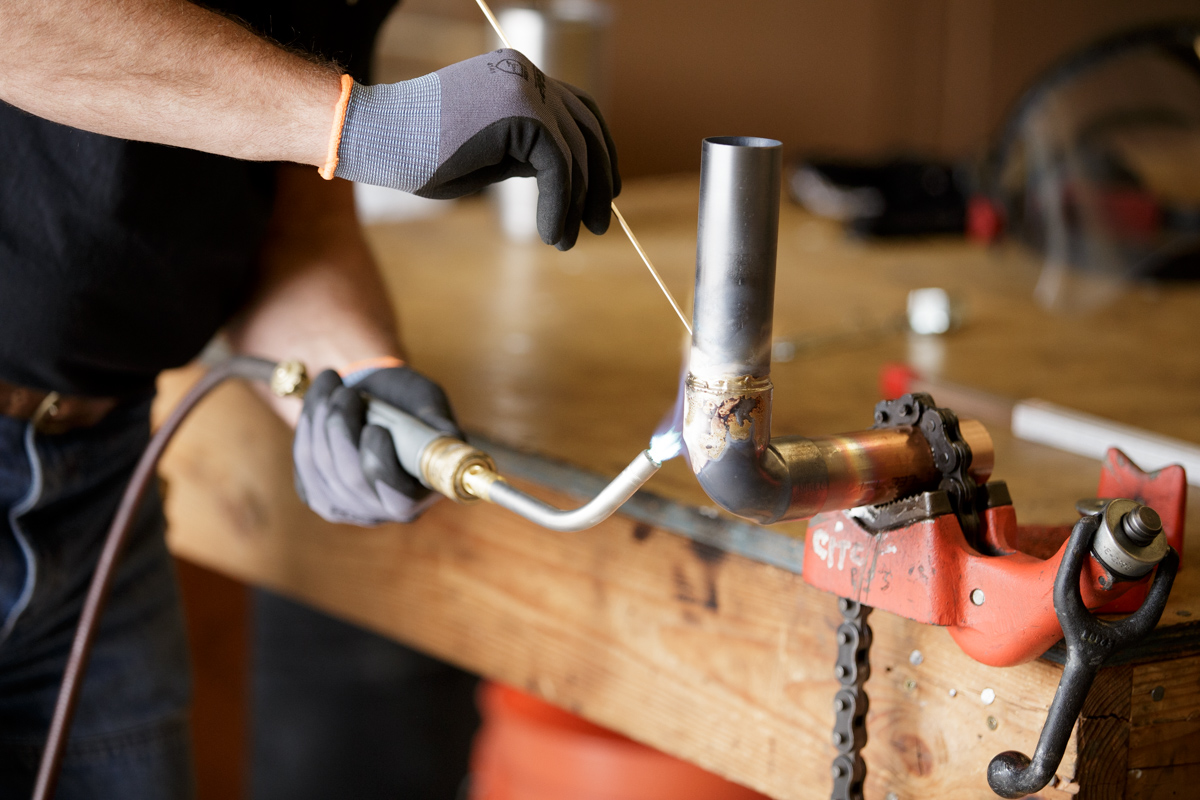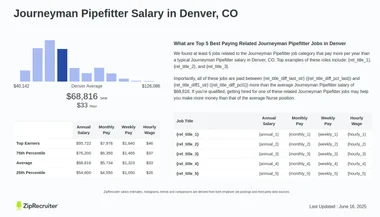With 40+ current pipefitter job openings available in Denver—check Indeed for the latest postings—and Colorado employment growth of 21% from 2012 to 2022, this skilled trade offers promising career prospects. Annual salaries can reach $61,250, with hourly wages ranging from $28 to $33.80 depending on experience 12; for detailed salary benchmarks, visit Salary.com. As infrastructure projects expand in water treatment, mining, and utilities, Denver remains a strong market for skilled tradespeople 23. This guide will walk you through the requirements, training programs, and career pathways for becoming a pipefitter in Denver by 2025.
Understand the Pipefitter Role
Pipefitters are skilled tradespeople who install, maintain, and repair piping systems used in industrial, commercial, and residential applications. Their work spans:
- Water and gas distribution systems
- Industrial manufacturing plants
- HVAC systems in large buildings
- Mining and extractive operations
Unlike plumbers who focus more on residential and commercial water systems, pipefitters typically handle high-pressure industrial piping that carries chemicals, gases, and other substances 4; for more on this profession, explore the BLS overview.
Do You Need Certification to Work as a Pipefitter in Denver?

While Colorado doesn't require a universal journeyman license for pipefitters, certification through apprenticeship programs is generally required for most jobs. The City of Denver Department of Community Planning and Development offers Mechanical Certificates, which require experience and passing exams like the ICC National Standard Journeyman Mechanical exam 3; learn more about these at Denver Gov. Employers across Denver and Colorado increasingly prefer certified, union-trained candidates for both entry-level and advanced positions.
Pipefitting Apprenticeship Requirements and How to Find One
Apprenticeships are the standard pathway to becoming a certified pipefitter in Denver. These structured training programs typically last 4 to 5 years, combining on-the-job experience with classroom learning4.
Here are Denver’s top apprenticeship options:
| Program |
Duration |
Requirements |
| Denver Pipefitters Local 208 |
4-5 years |
High school diploma or GED, drug screen, Kenexa Prove It test |
| Emily Griffith Technical College |
4-5 years |
18+, GED, valid driver’s license |
To start your apprenticeship journey in Denver:
- Complete any prerequisite courses in algebra, mechanics, and safety protocols
- Visit Gild to find current apprenticeship and entry-level pipefitting job opportunities in Denver
- Submit transcripts, age verification, and work experience records for Local 208 and Emily Griffith programs within 30 days of application 1; for training details, check Plumbers Local.
Steps to Becoming a Pipefitter in Denver
1. Meet Basic Requirements
- Be at least 18 years old
- Have a high school diploma or GED equivalency
- Submit proof of age and any prior work experience documentation 1
2. Enroll in a Registered Pipefitting Apprenticeship
Pipefitters Local 208 offers comprehensive training programs with state-of-the-art facilities 2. This is a competitive program requiring a drug screen and Kenexa Prove It test 1. Apprentices will rotate through different types of piping systems and welding techniques during the program.
3. Complete Field Training
Over a 4-5 year period, apprentices accumulate hundreds of hours learning to:
- Measure, cut, and assemble pipe sections
- Install and maintain complex industrial piping systems
- Interpret engineering drawings and schematics
- Practice safe work procedures in industrial settings
Upon completing your apprenticeship, you’ll qualify as a journeyman pipefitter ready for independent work 4; see ZipRecruiter for related job listings.
4. Obtain Certifications
While not always mandatory, certifications like the ICC National Standard Journeyman Mechanical certificate can significantly improve your job prospects in Denver 3. Some employers may also require welding certifications depending on the specialization path.
Career Advancement Opportunities
After becoming a journeyman, Denver pipefitters have several advancement options:
Lead Roles
With sufficient experience, pipefitters can become Sprinkler Pipefitter Foremen or team leads overseeing installations and maintenance operations 1.
Material Specializations
Develop expertise in working with:
- Carbon steel for oil and gas pipelines
- Copper for water systems
- Stainless steel, requiring skills in MIG and TIG welding techniques 12
Industry Diversification
Denver’s pipefitters work across diverse sectors including:
- Water treatment plants
- Mining operations
- Utilities infrastructure
- Oil and natural gas processing 13
Pursuing additional certifications can open doors to supervisory roles, project management, or even entrepreneurial opportunities in pipefitting contracting.
Pipefitting Job Outlook and Industry Trends in Denver through 2025


Denver's pipefitting industry continues to grow, driven by:
Infrastructure Expansion
Ongoing development in water treatment centers, utilities, and industrial facilities sustains demand for skilled pipefitters across Denver 2.
Competitive Compensation
Hourly wages range from $28 to $33.80, with top industrial positions offering up to $67 per hour 43. This places Denver near the national median, slightly below premium markets like Houston or San Francisco 2.
Workforce Development Initiatives
Organizations like the Denver Pipefitters Local 208 emphasize continuous skill development through apprenticeship contests 2. The Denver Regional Talent Summit also addresses workforce challenges in key industries, including construction trades 4; for more insights, visit CoChamber.
According to state data and job postings, Colorado's strong 21% growth from 2012-2022 indicates the demand will continue into 2025 and beyond 5.
Challenges and Safety Considerations
Pipefitting remains a physically demanding trade that involves:
- Working in confined spaces or at height
- Handling hazardous materials
- Using dangerous cutting and welding equipment
Denver pipefitters must comply with OSHA standards and employer safety protocols to minimize workplace injuries 6. The industry also faces workforce development challenges, with growing demand outpacing new entrants to the trade.
Your Next Step: Find a Pipefitting Apprenticeship in Denver
Starting a career in pipefitting connects you with a dynamic, in-demand trade that offers stability and growth. Whether you're leaving high school or considering a career change, the opportunities in Denver's construction and industrial sectors have never been stronger.
To begin your journey:
-
Explore current pipefitting apprenticeships in Denver on Gild
-
Prepare for the Kenexa Prove It test, a common requirement for Denver apprenticeships 1
-
Submit your documents for programs like Pipefitters Local 208 within 30 days of opening 2; check Indeed for ongoing opportunities.
Sources

